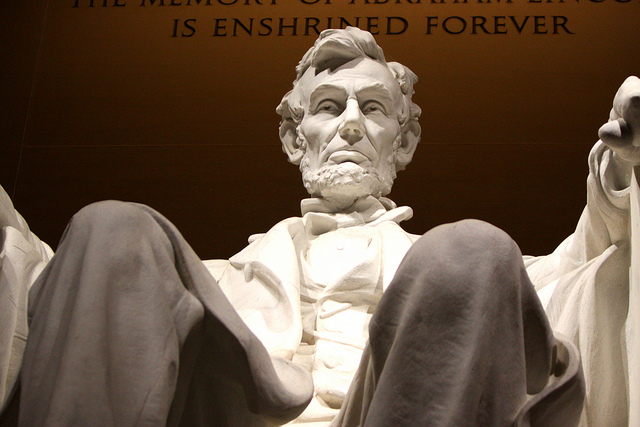Saving the Euro at all costs could lead to an eventual hollowing out of European democracy
Since the global financial and Eurozone crises hit Western economies, a process of change has been underway which has seen a new model of technocratic financial and economic governance take hold across Europe. Alexander Ruser argues that these reforms – born of a desire to save the Euro “at all costs” could see democracy eventually hollowed out, as the will of the people increasingly begins to come secondary to the whims of markets and currency.

Credit: Gage Skidmore, CC BY NC 2.0
Abraham Lincoln defined democracy as government of the people, by the people, for the people. Markets, however, he chose not to mention at all. It may be that Mr. Lincoln was dealing with an idealistic, out-dated definition of democracy.
A brief look at the recent discussion about the viability of democracies in global market economies, in particular since the financial crises reveals two problems: Democratic decision-making is either seen as the main driver of public debt, or rendered irrelevant given the firm grip of the global invisible hand. Sometimes, commentators even try to have it both ways:
This is particularly visible in an more recent essay in The Economist which states that ‘the financial crisis starkly exposed the un-sustainability of such debt-financed democracy’ only to continue that ‘national politicians have surrendered ever more power (…) to global markets and supranational bodies, and may thus find that they are unable to keep promises they have made to voters’. Despite this apparent contradiction the lesson learned is rather simple: Politicians either cannot keep their promises or they should not. Maybe they should stop making promises altogether?
It is obvious that elected representatives are increasingly accountable to a second constituency: the markets. This could indicate the advent of a Schumpeterian version of democracy in which democracy does and cannot mean that the people actually rule in any real sense. Which of these two constituencies is more important? Given the apparent market failures, and the inability of mainstream economists to explain (or predict) the crisis, one could have expected a critical examination of the gospel of the ‘free market’ and subsequently a shift of power towards ‘the people’ who gave away billions of tax money to save the financial system.
However, precisely the opposite happened. From the perspective of institutional theory, the crisis seems to have caused a ‘punctuated equilibrium’ allowing ‘large- scale departures from the past’. However, an ‘advocacy coalition’ (consisting of the key players in the EU, such as the ECB, the European Commission and economically powerful members like Germany and France) made every possible effort to convince the public that the equilibrium was in fact intact. Instead of critically examining the scientific foundation of pre-crisis economics or questioning the policy advice given by the same experts, the overall aim was to defend the financial order. And successfully so: after the dust of the initial crisis has settled ‘blame has shifted from the markets to the state’
However, in 2015 we haven’t simply returned to pre-crisis politics: Budgetary rigour, austerity, and the dogma of winning back the ‘trust of the markets’ have not only become predominant political goals but have acted as catalysts for a more technocratic form of decision-making.
There are two factors here: Firstly the crisis response mechanisms (e.g. the collection of crisis management instruments known as ‘European Financial Stabilization Mechanism’ (EFSM) and ‘European Financial Stability Facility’ (EFSF)) originally invented as ad-hoc and temporary political instruments grew into a whole new system of economic governance. In contrast to the way institutional reform is normally carried out in the EU, this new system was driven by an enormous sense of urgency, which in itself was fuelled by a relentless flow of bad news. The sense of ‘running out of time’ is key to understanding why and how such far-reaching reform was done ‘in extreme haste’.
Secondly, democratic decision-making is seen as a threat. The crisis response mechanisms are facing increasing resistance from the public, particularly in the most crisis-ridden member states. In 2011 when the Greek government was forced to cancel a referendum aimed at securing popular support for austerity measures due to the concern that the population would reject European recommendations. The fear that public participation would conflict with the imperatives of the markets was echoed in the run up of the Greek referendum in July 2015. Discredited as ‘populist’ and it´s outcomes painted in the darkest colours, the imminent threat seems to have been democracy itself. Accordingly the referendum and subsequently attempts to throw the weight of democratic legitimation in the negotiations by the Greek government have been torpedoed by the advocacy coalition, most prominently Germany.
If democracy is about choice, markets are about efficiency. And if democratic choice comes in the way of reforms preferred by market participants one or the other has to give way. It should not be argued here that the ‘will of the people’ will always get the things right. Maybe Normal Powell was correct that ‘people are turbulent and changing; they seldom judge or determine right’.
Can the EU afford to follow the will of turbulent, wavering people? For some, the answer is: no. They propose to hand over decision-making to ‘reasonable technocrats’ instead. This not only promises to save people form their own short- sightedness but would also be preferable over the (impossible) promises of ‘populist’ or the take over of political extremists.
Effectively the ‘reasonable technocrat’ is a second coming of Margaret Thatcher’s (and, more recently: Angela Merkel´s) TINA politics. If ‘there is no alternative’, ‘necessary action’ must be taken. It is arguably the core feature of the above mentioned advocacy coalition to refuse to call their core beliefs on economics into question. All to avoid frightening the markets.
But has democracy proved itself being incapable of coping with the crisis? Maybe one should ask what a ‘reasonable technocrat’ actually looks like. A reasonable politician may always be urged to follow the wishes of their voters and thus might make wrong decision. In contrast, the reasonable technocrat is bound to a specific theoretical paradigm and therefore runs into the danger to make logical but callous decisions. However, it may be hard to tell the reasonable from the unreasonable technocrat, the one who follows personal interests, affiliates with elites or entertains an ideological world view rather then the impartial assessment of the rational expert.
Putting too much trust in experts (reasonable or not) is always dangerous. For it may herald the hollowing out of European democracy and the marginalisation of the original constituency: the people. Back in 2012, the European Central Bank chief Mario Draghi was determined to ‘save the Euro at all costs’. If these costs include the viability of European democracy, one might ask: what was the Euro saved for?
—
This post represents the views of the authors and not those of Democratic Audit UK or the LSE. Please read our comments policy before posting.
—
 Alexander Ruser is a postdoctoral researcher at Zeppelin University Friedrichshafen and was a Dahrendorf Fellow at Hertie School of Governance, Berlin and the LSE. His research and fields of expertise include: comparative political sociology, EU politics, political consulting, environmental sociology and social network analysis. Alexander worked closely with Helmut Anheier and Arne Westad on the future role oft he EU on the global stage
Alexander Ruser is a postdoctoral researcher at Zeppelin University Friedrichshafen and was a Dahrendorf Fellow at Hertie School of Governance, Berlin and the LSE. His research and fields of expertise include: comparative political sociology, EU politics, political consulting, environmental sociology and social network analysis. Alexander worked closely with Helmut Anheier and Arne Westad on the future role oft he EU on the global stage





 Democratic Audit's core funding is provided by the Joseph Rowntree Charitable Trust. Additional funding is provided by the London School of Economics.
Democratic Audit's core funding is provided by the Joseph Rowntree Charitable Trust. Additional funding is provided by the London School of Economics.
[…] να γίνει αποδεκτό σε κάθε χώρα του πλανήτη. Αν το δόγμαΤΙΝΑ, «δεν υπάρχει εναλλακτική λύση, θα πρέπει να ληφθούν […]
[…] να γίνει αποδεκτό σε κάθε χώρα του πλανήτη. Αν το δόγμαΤΙΝΑ, «δεν υπάρχει εναλλακτική λύση, θα πρέπει να ληφθούν […]
TINA and the mutated EU is an environment of bullying, hijacking of democracy, a maoistic form of capitalism.
What if everybody starts using it? Is it just a matter of power; a neo-barbarism? It is supposed to be a matter of civilization since several centuries already.
I doubt that TINA is an “unpleasant but necessary sacrifice” for the purpose of saving euro; Repeting persistently the lethal dosage of medication is strong evidence that saving euro is the means and TINA is the purpose.
No wonder that essentially a TINA dogma was THE excuse for the establishment of the nazi camps.
The rest is traumatizing propaganda, divide and reign.
[…] να γίνει αποδεκτό σε κάθε χώρα του πλανήτη. Αν το δόγμα ΤΙΝΑ, «δεν υπάρχει εναλλακτική λύση, θα πρέπει να ληφθούν […]
[…] να γίνει αποδεκτό σε κάθε χώρα του πλανήτη. Αν το δόγμα ΤΙΝΑ, «δεν υπάρχει εναλλακτική λύση, θα πρέπει να ληφθούν […]
Saving the Euro at all costs could mean more technocratic decision-making, and the gradual hollowing out of democracy https://t.co/K85CoYtL2M
[…] This article originally appeared at our partner site, Democratic Audit. It gives the views of the author, not the position of EUROPP – European Politics and Policy, […]
“@democraticaudit:saving the Euro at all costs could lead to an evt hollowing out of Eur democracy https://t.co/XfuYt5ykGq” via @went1955
Saving the Euro at all costs could lead to an eventual hollowing out of European democracy https://t.co/cWaxsu27Jt
Saving the Euro at all costs could mean more technocratic decision-making, and the gradual hollowing out of Europe… https://t.co/o7qGD36xGZ
Saving the Euro at all costs could lead to an eventual hollowing out of European democracy: Since the global f… https://t.co/6v3tGBowV7
Saving the Euro at all costs could mean more technocratic decision-making, and the gradual… https://t.co/8KfsZUsig4 https://t.co/wAVVJ2gCHJ
Saving the Euro at all costs could lead to hollowing out of European democracy — @democraticaudit — https://t.co/Qe0W9C9Eut (ht @ReneCuperus)